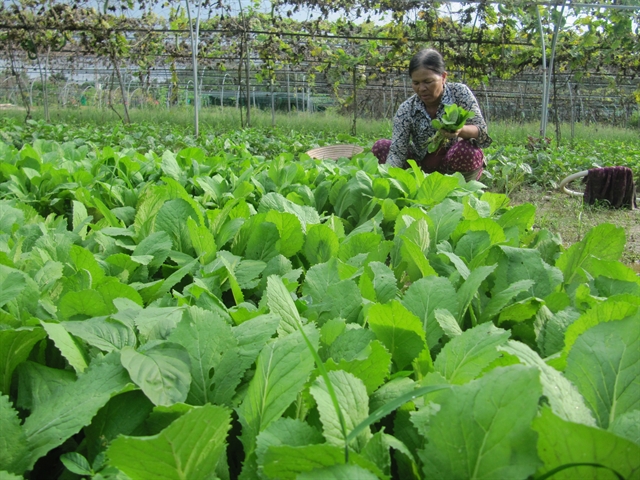 Society
Society

The village, 20km northwest of the city, along with La Hường Village in Cẩm Lệ District, is one of two major sources of green vegetables for the city.

|
| Nguyễn Thị Tùng, 66, harvests vegetables at a safe farm zone in Túy Loan Village of Đà Nẵng. — VNS Photo Công Thành |
Công Thành
ĐÀ NẴNG — Farmers in Đà Nẵng are going green, using chemical-free fertiliser and bio-pesticide.
The farmers in Túy Loan Village in Hòa Vang District are also using the Việt Nam Agriculture Practice (VietGAP)-Participatory Guarantee system (GPS) application that gets farmers, shops, consumers and the administration involved in quality supervision.
The village, 20km northwest of the city, along with La Hường Village in Cẩm Lệ District, is one of two major sources of green vegetables for the city.
It’s also the first co-operative in the city to build an agricultural production chain and food safety brand.
The first 50 households in the village agreed to join the co-operative and strictly control the use of bio-pesticides and fertiliser and check each other's farm diaries.
The co-operative supplies 200kg of safe vegetables to local markets each day from a 8ha farm, earning a net profit of VNĐ30 million (US$1,300) each month and a monthly income of VNĐ5.5 million ($239) for each of the 50 farmers.
Nguyễn Thị Tùng, 66, said she has been working on a 750sq.m vegetable farm with less chemical-based fertiliser, pesticide and weed-killer.
“I saw that overuse of chemicals and pesticides had affected my health. I have spent more time with manual clearing work on grass and pests,” Tùng said.
“Formerly, we had to have at least 15-days off after spraying herbicide, but now we work every day in the field by reducing chemical-based pesticide,” she said.
The old farmer said she had to do more manual work, but suffered less exposure to toxic pesticides and weed-killer.
She said the quality of vegetables has improved since urea was not used by farmers in the village now.
Huỳnh Tấn Hoàng, 67, said using less chemical fertilier also helped cut 30 per cent of production costs.
“Our safe vegetables are sold at the price two times as much as that of farm produce from other chemical-using farms. We also fill information into a daily field book before products are sealed and branded. It’s easy to track the source of products after sale through strict procedures and paperwork,” he said.
“Only qualified vegetables will be collected by the Túy Loan co-operative on orders from supermarkets and shopping centres in the city.”
Hoàng, however, said manual work occupied 80 per cent of production costs, so they needed machinery and innovation to cut labour costs.
Đặng Thị Thanh Sang, a member of the co-operative, said at least 200kg of herbs and vegetables are harvested and packaged for delivery to big shopping centres in the city’s downtown daily.
“We have connected with big trade centres – Big C, VinMart and international schools – in supplying qualified safe farm produce,” Sang said.
“The co-operative helps farmers deliver their products to the market with a negotiated stable price. This means farmers do not need bring vegetable to the market themselves, while the co-operative helps them link up with trusted suppliers of seed and bio-fertiliser,” she said.
Lê Mỹ, an official from the city’s Plant Protection sub-department, said useful bugs were bred to kill worm larvae at farms, while solar-powered pest catching lamps were installed to deal with caterpillars.
Nguyễn Thanh Quang, from the city’s science and technology associations, said Túy Loan farmers have built links with 14 shopping centres and weekly farmers' fairs in the city to sell their produce.
He said farmers did cross-check procedures for fertiliser and bio-pest spraying to ensure farm products are fresh and safe.
Quang said the city has assigned seven safe farm zones to meet 30 per cent of the city’s vegetable demand.
Nguyễn Quang Dũng, head of the Túy Loan Co-operative, said the farmers also plant flowers to attract bees and ants, while powdered lime was used to fight pest larvae.
Dũng suggested hi-tech solutions such as drip irrigation, bio-pest automatic sprayers and agri-motors are needed to reduce manual work on farms.
The Túy Loan Co-operative has also received supports from Rikcolto-funded project from Belgium to boost supply of safe vegetables.
Hoàng Thanh Hải, co-ordinator of the RIKOLTO project, said it helped build a PGS system for farmers in the two farm zones as well as retail market links.
The 1.1 million population in Đà Nẵng City consumes 145,000 tonnes of seafood and 140,000 tonnes of vegetables per year, but 70 per cent is supplied by neighbouring provinces of Lâm Đồng, Gia Lai, Kon Tum and Quảng Nam. — VNS




